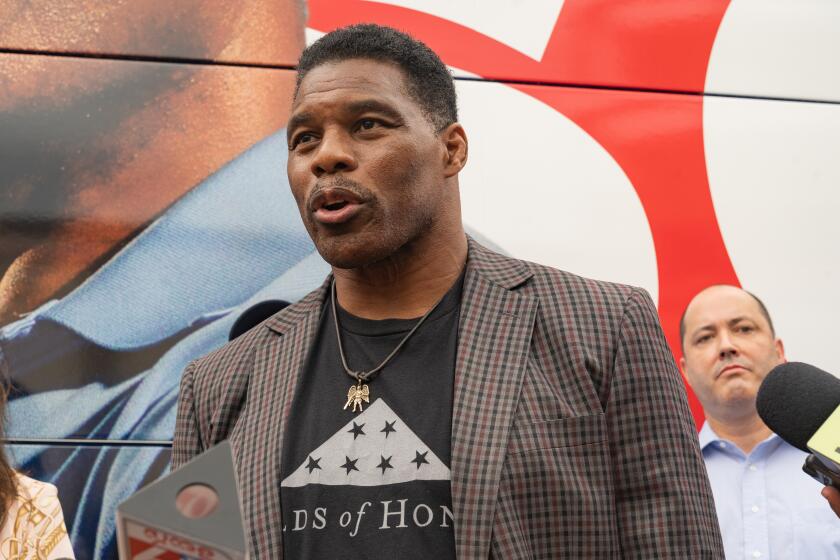Vampires, voter access and the turnout dance: Georgia’s Senate runoff remains a question mark
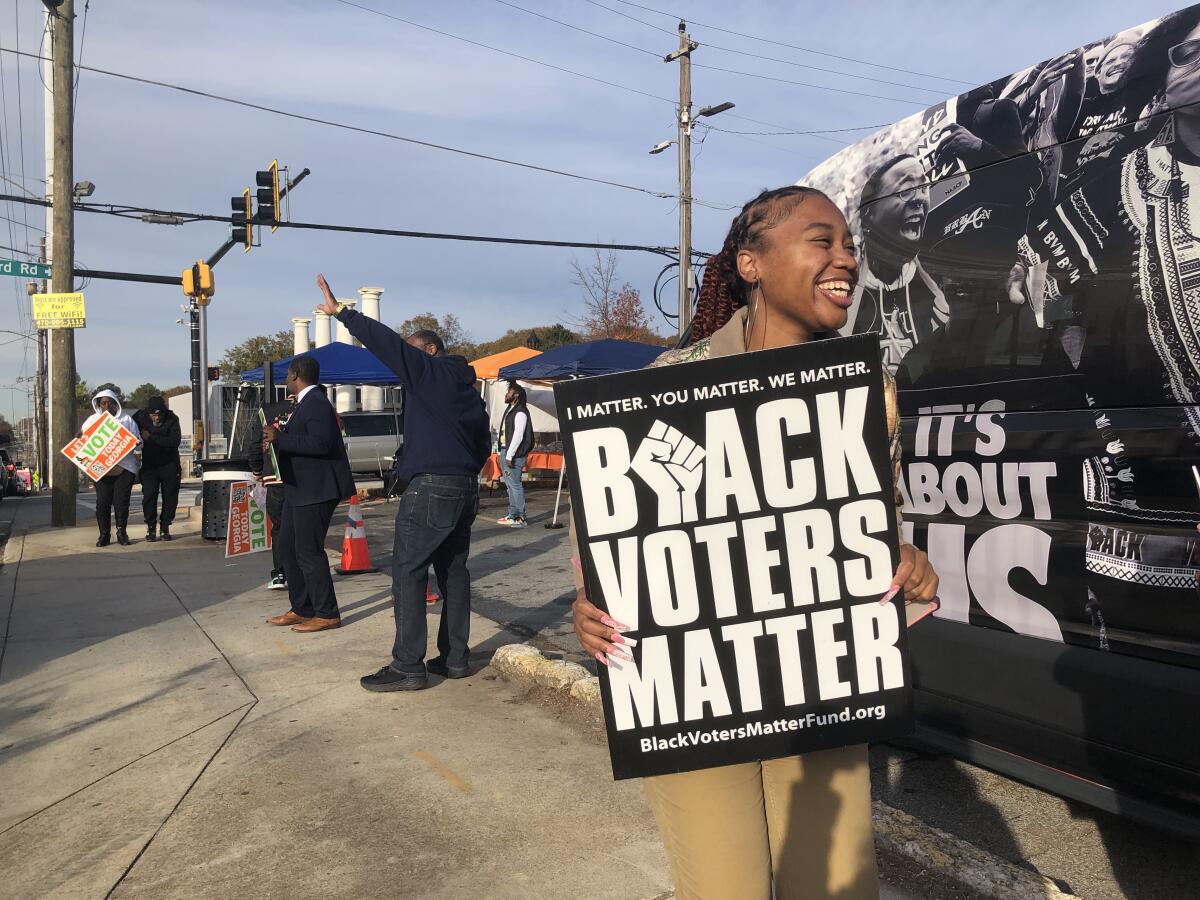
ATLANTA — Over the last week, LaTosha Brown has been in full-throttle mode, leading grassroots voting rights activists fanning across Georgia, canvassing door to door, hosting screenings of “Black Panther: Wakanda Forever,” dancing to hip-hop outside polling stations.
But after watching people wait more than an hour in some metro Atlanta areas to vote in the Senate runoff race, Brown is uncertain whether her group’s efforts to increase turnout will be enough to secure a win for Democratic Sen. Raphael Warnock over Republican Herschel Walker on Tuesday.
“It’s a tight race. The Democratic base is fired up,” said Brown, co-founder of Black Voters Matter, which has spent $2.5 million to boost turnout in the runoff. “We can’t out-organize voter suppression, but we’re just doing everything we can to win.”
With voter motivation high on both sides, early turnout in this runoff broke daily records three times last week — a fact Georgia’s Secretary of State Brad Raffensperger, a Republican, used to dismiss allegations of voter suppression as “conspiracy theories no more valid than Bigfoot.”
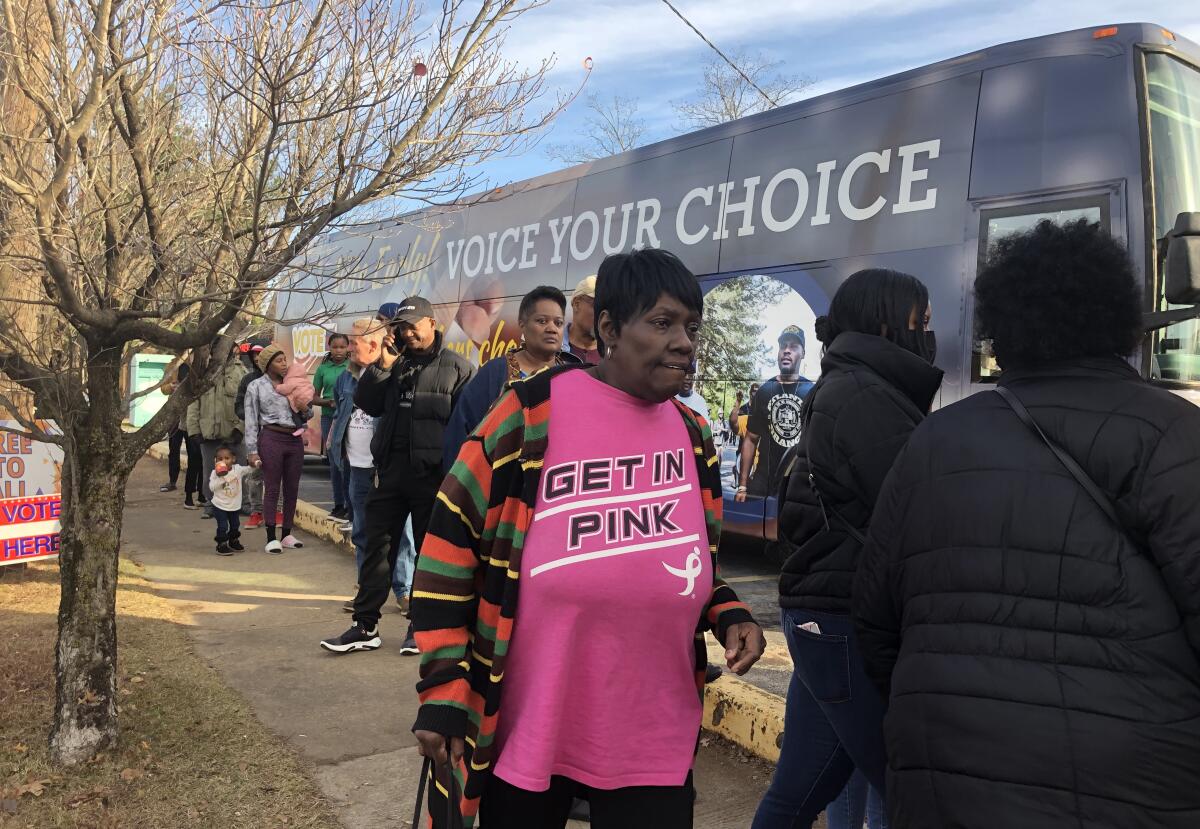
But overall early voter turnout is still lower than previous elections, with far fewer chances for Georgians to cast in-person ballots. After early voting ended Friday, about 1.8 million people had cast ballots, compared with 2.5 million in the general election and 3 million in the 2021 Senate runoffs.
In Georgia, Democratic Sen. Raphael Warnock and his Republican challenger, Herschel Walker, are headed for a Senate runoff election.
Activists blame an election law passed last year by the Republican-dominated state Legislature, which cut the runoff election calendar in half. In some counties, early voting sites were open for only five days. The law also limits drop boxes, stops election officials from mailing absentee ballot applications to all voters and gives voters less time to request ballots.
The stakes for the Georgia runoff on Tuesday, the last U.S. Senate battle of the 2022 election cycle, are lower than in 2021: Democrats have already secured the 50 seats they need to control the Senate, with Vice President Kamala Harris able to cast tie-breaking votes in her role as president of the chamber.
Winning a 51st seat would let Democrats out of a power-sharing agreement for committee assignments and diminish the power of moderate Democrats — such as Joe Manchin III of West Virginia and Kyrsten Sinema of Arizona — who have stymied or slowed their party’s legislative agenda. A Warnock victory would also bolster the idea that Democratic victories here in 2020 and 2021 were not flukes and that this once reliably red Southern stronghold really is a purple state.
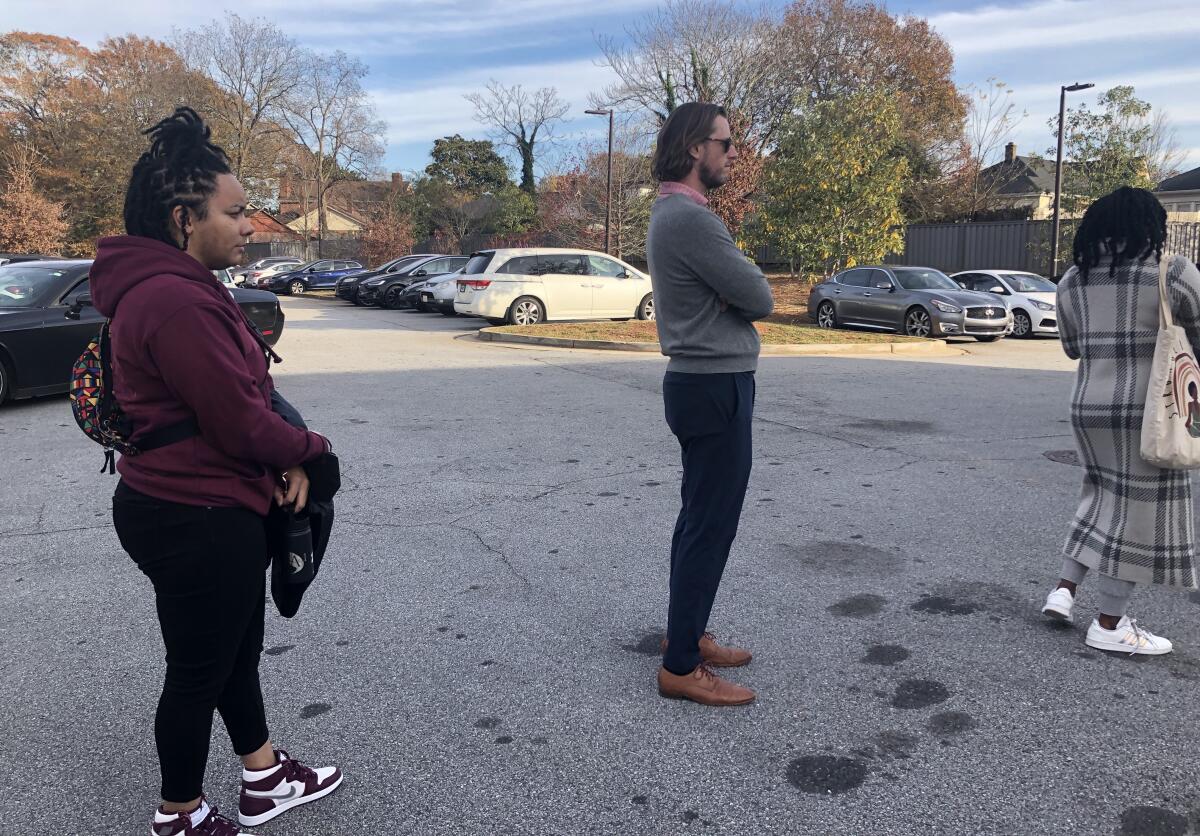
After early voting wrapped up Friday, Democrats appear to have a sliver of an edge: Black voters, who make up a third of Georgia’s population and form the backbone of the state’s Democratic Party, represent 32% of the overall early voting tally so far, higher than early turnout in the midterms. Participation of young voters, who tend to vote Democratic, was also slightly stronger than usual. But Republicans could close the gap Tuesday: Older, white Georgians typically vote in higher numbers on election day.
As Democratic and Republican campaigns scrambled to motivate voters, they have mostly eschewed complicated arguments about power sharing in Washington and the makeup of the Senate.
Instead, Republicans argue that a vote for Warnock, senior pastor of the Atlanta church where the Rev. Martin Luther King Jr. preached, is a vote for President Biden and the status quo. Democrats counter that former University of Georgia football star Walker — a Trump-backed candidate who earned a reputation on the campaign trail for lies, gaffes and bizarre comments — is not suitable for public office.
“What’s easier for voters to understand: the mechanics of having 51 versus 50 senators, or just continuing to remind people that Herschel Walker is unfit?” said Erick Allen, a Democratic Georgia state representative.
That view was countered by Republican former state Rep. Buzz Brockway, who said most GOP voters were motivated, even if they were ambivalent about Walker, who has been embroiled in scandals including allegations that, though he opposes abortion, he has encouraged and paid for sexual partners to undergo the procedure.
“Now you’ve registered your objection by either skipping that race or voting for the libertarian, you’ve registered your complaint,” Brockway said, referring to a third-party candidate who got just over 2% of the vote last month. “Now it comes down to how much power do we want Democrats to have in the Senate?”
Other Republicans are not so sure — at least one prominent Republican acknowledged that he did not vote for Walker. Lt. Gov. Geoff Duncan said last week on CNN that when he looked at the runoff ballot, “I just couldn’t find anything that made sense for me to put my vote behind.”
In the general election, Walker underperformed in a state where Republicans won every other statewide seat, receiving 38,000 fewer votes than Warnock. Now both sides are homing in on the more than 200,000 voters who voted for Republican Gov. Brian Kemp but not Walker.
Both sides have boosted field operations, yet Democrats have vastly outspent Republicans on TV and radio advertisements in the runoff — shelling out more than $55 million compared with Republicans’ $26 million, according to AdImpact, a media tracking firm.
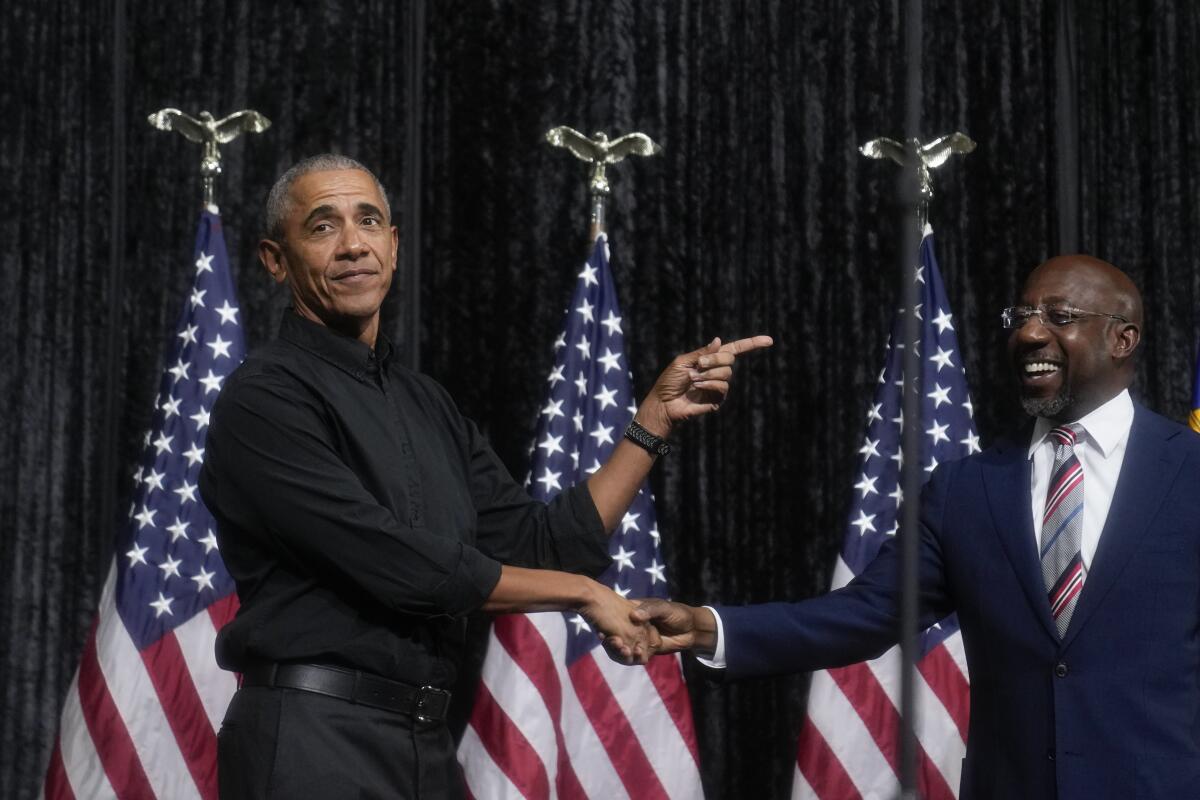
As Democrats began a push for early voting over the Thanksgiving weekend and Warnock held a flurry of rallies, including a Souls to the Polls march, Walker skipped the campaign trail.
On Thursday, former President Obama rallied in Atlanta with Warnock, urging Democrats to keep pushing. “If the men and women who had to endure the sting of discrimination, the smack of billy clubs ... if they didn’t get tired, you can’t be tired,” he said.
Walker’s campaign eschewed help from former President Trump, who is widely seen by Georgia Republicans as a liability after his 2020 defeat in this state and the failures of candidates he endorsed in the midterms.
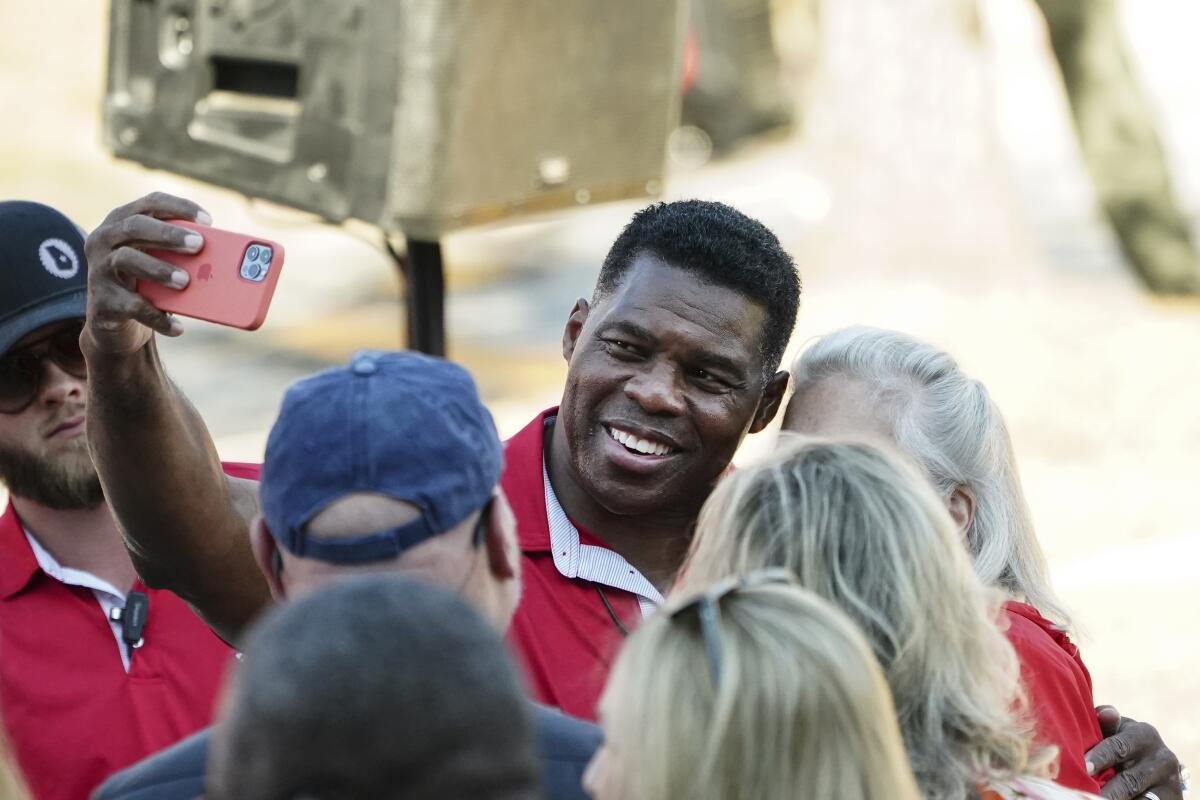
Instead, Republicans have relied on Kemp, who breezed to reelection in November, to sway voters. Kemp campaigned for the first time with Walker two weeks ago, calling him “my friend” at a rally outside a gun store in Cobb County.
In an ad that ran over Thanksgiving, Kemp urged conservatives to the polls: “Families are struggling because of Biden’s inflation, and Washington won’t change unless we make them. Herschel Walker will vote for Georgia, not be another rubber stamp for Joe Biden.”
That message appealed to many conservatives who lined up on the first day of early voting in Forsyth County, an Atlanta exurb where two-thirds of voters backed Walker in the general election.
As Connie Andrew, 74, a retired bus driver from Cumming, put it: “I want Democrats to have less power.”
But Walker’s support trailed Kemp’s by 7.5 percentage points in Forsyth, more than any other county in Georgia, and Kemp’s pitch does not appear to be resonating with some of the crucial voters who backed Kemp but not Walker.
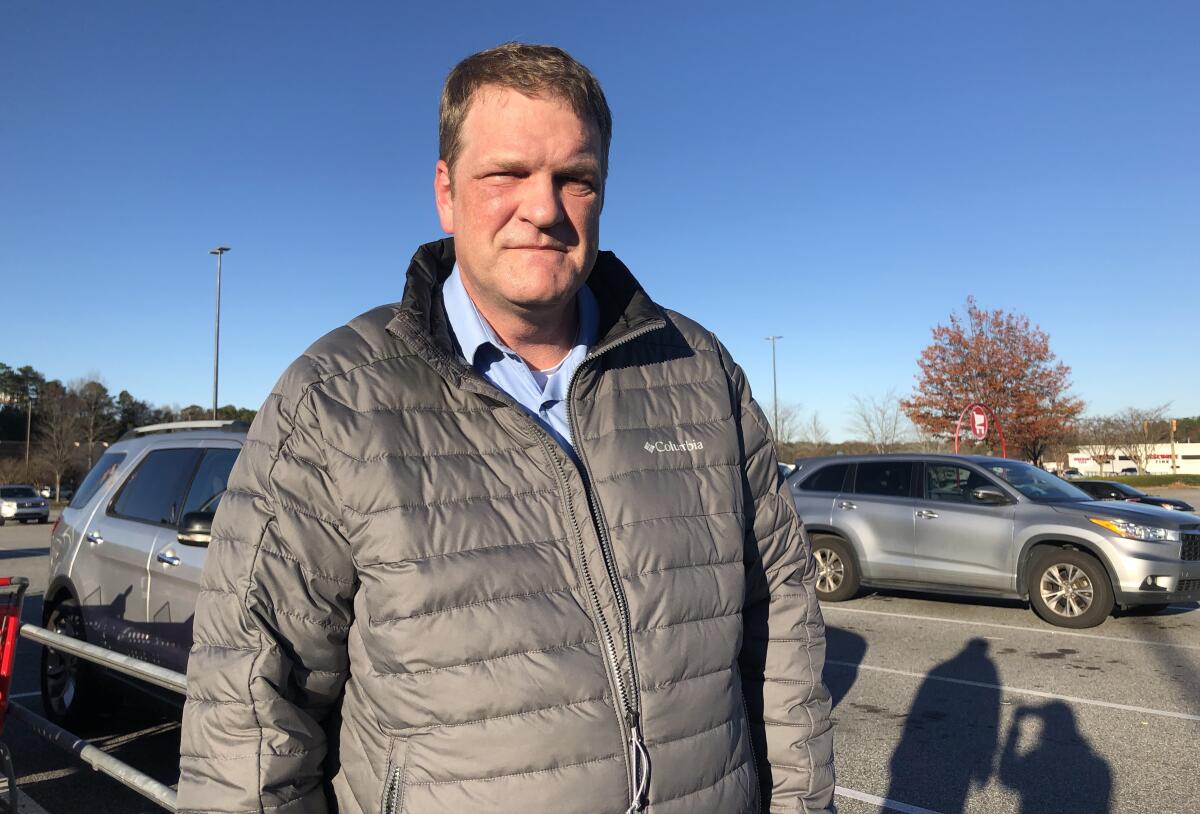
“I still don’t think he’s fit for office,” Steve Smith, a 55-year-old technical engineer from Cumming, said of Walker after voting again for Warnock.
An independent who supports Kemp, Smith said he approved of Warnock’s performance so far, particularly how he worked with Republicans and independents to bring down insulin prices.
“I vote for who I think’s gonna do a better job,” Smith said. “Not party favor.”
A Warnock TV ad released over Thanksgiving showcased a Republican voter who split her ticket in the general election for Kemp and Warnock.
In an age of tribalization, are there limits to party loyalty? Could Herschel Walker, urged to run by Trump, cost Republicans control of the Senate?
“The more I heard about Herschel Walker, I became concerned about his honesty, his hypocrisy, but also just his ability to lead,” said the voter, Lynn Whittenburg. “I just can’t get past Herschel Walker’s lack of character. The fact that he lies so freely is very concerning to me.”
In the last stage of the campaign, Democrats have assailed Walker, who lived in Dallas for two decades, for claiming his Texas home a primary residence in 2021 and this year on his taxes even after launching his Georgia Senate bid.
Warnock has also played up some of Walker’s bizarre utterances, with one TV ad featuring voters’ facial expressions as they watch Walker speak on the campaign trail about vampires and werewolves and “bad air from China.”
“What the hell is he talking about?” one viewer asks.
Republicans, in turn, have churned out negative ads against Warnock, playing up a 2020 domestic dispute in which Warnock’s ex-wife accused him of running over her foot with his car and allegations that Warnock’s church threatened to evict tenants of an apartment building during the pandemic.
Still, some Republicans concede that the GOP has not been able to match progressive coalitions’ early get-out-the-vote enthusiasm.
“Republicans have not fully embraced early voting as a method of getting their people to polls,” Brockway said. “I think that’s a mistake.”
Going into the runoff, Republican state officials tried to block early voting on the Saturday after Thanksgiving, saying the law did not allow counties to offer voting following state holidays, but Georgia’s Supreme Court sided with Democrats — a decision that resulted in a bounty of early weekend votes in the state’s largely Democratic urban counties.
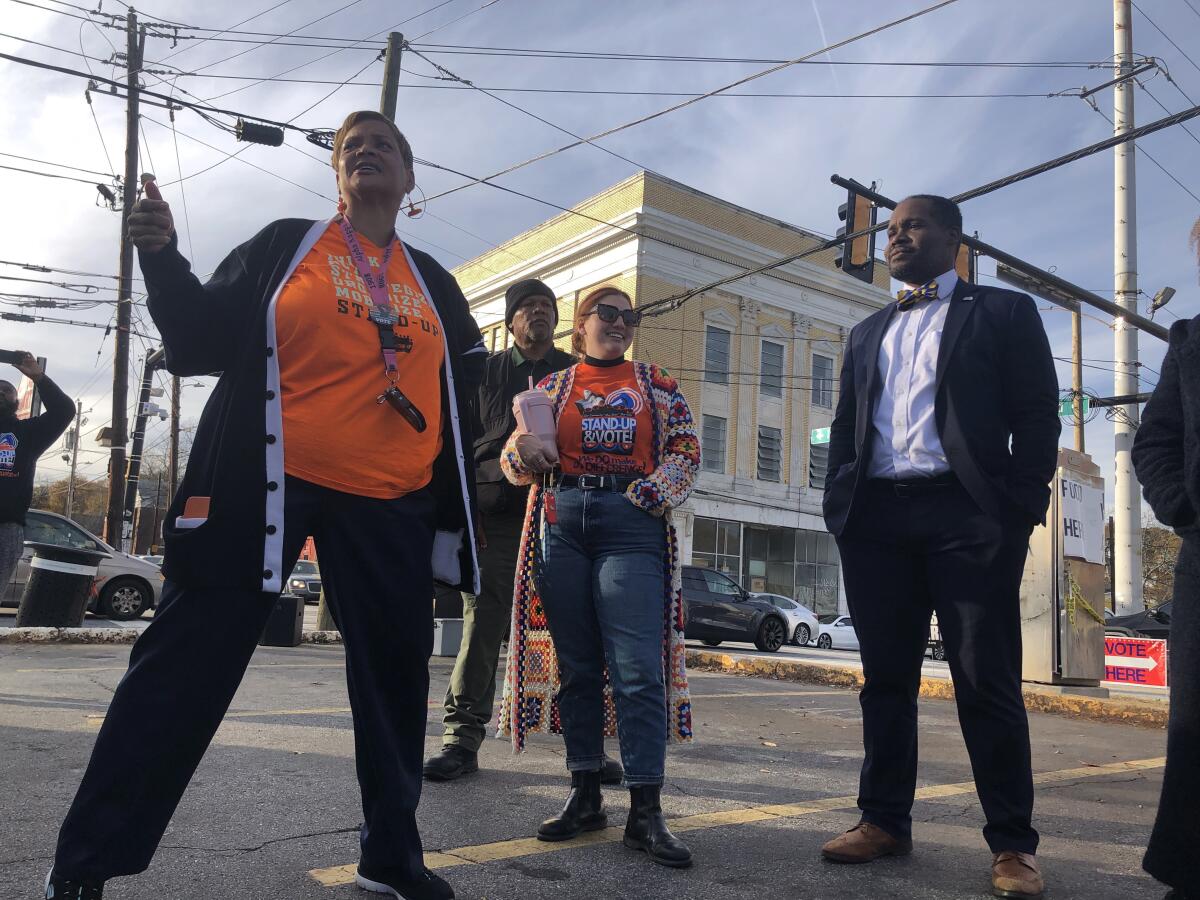
At 6:30 a.m. every day of early voting, a small huddle of activists with Georgia STAND UP, a grassroots community organizing group, gathered at an auto-parts store parking lot near a polling station in a predominantly Black neighborhood of southwest Atlanta.
Georgia law forbids handing out food or water within 150 feet of polling places or 25 feet of any voter waiting in line to vote, but organizers picked a spot across the street to set up a get-out-the-vote rally turned block party.
The party was in full flow Thursday afternoon as activists from Black Votes Matter and the NAACP showed up. A DJ blasted old-school hip-hop and Southern crunk, food trucks doled out fried fish and chicken wings, and activists handed out water, hand warmers and pins reading, “STAY WOKE. VOTE.”
“Honk if you voted!” an activist bellowed through a megaphone.
A long line of men and women stretched out along the side of a four-lane highway, shimmying to Unk’s “Walk it Out” and waving placards that said “Let’s vote today” and “Black Voters Matter.”
Walk, walk, walk, now walk it out.
Walk, walk, walk, now walk it out.
Around the corner, in a line of nearly 100 voters snaking around the Metropolitan Library polling place, Alethea Lamberson, a 35-year-old diversity, equity and inclusion consultant, thought about the sacrifices made to allow her to vote. That right, she said, was still in jeopardy in Georgia after Republicans passed measures restricting voting access.
“Some of the people here are actively trying to suppress our vote,” she said. “But I think that’s actually motivating people to stick it out.”
At the end of their shift, nearly 20 activists huddled in a circle and Deborah Scott, CEO of Georgia STAND UP, told them that voting was up at the precinct.
The team whooped and cheered as she said the group had already surpassed its goal of 300,000 phone calls and 200,000 texts and was about to reach its goal of 50,000 doors knocked.
“It looks good for progressives,” Scott said as she grinned at her team; they planned to keep hustling until election day.
More to Read
Get the L.A. Times Politics newsletter
Deeply reported insights into legislation, politics and policy from Sacramento, Washington and beyond. In your inbox three times per week.
You may occasionally receive promotional content from the Los Angeles Times.
